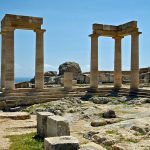It remains, then, to inquire the way in which the soul moves the body, and what is the origin of the animal’s motion. For the ensouled, save the motion of the universe, are responsible for the motion of the rest, providing not to move by each other through bumping against each other. This is why all their movements have a limit; and so do the motions of the ensouled. For all animals are both movers and being moved for the sake of something, so that this is the limit of all their motion: the for-the-sake-of-something.
What produce motion to animal
We also see that what produce motion to animal are intellect, imagination, choice, will, and wish. And all these can be reduce to intellect and desire. For both imagination and perception possess the same place as intellect; for both of them can distinguish, but are different in things that we have discussed in previous works of ours.
Again will and spiritedness and wish are all sorts of desire, whereas choice is common to both intellect and desire. So the first mover is the object of desire and the one of thought — not every object of thought, but the end of things that are concerned with actions. Hence the mover is of this sort of good, but not whatever is fair; for it is on the ground that something else is for its sake, and in so far as it is the end of things that are for the sake of something else that can produce movement. We must also take as good whatever seems to be so, as well as the pleasant; for it is an apparent good.
So it is clear that in one point of view what is constantly being moved by what constantly moves is doing so by the same way as that of each animal, but in another differently, whence some are constantly being moved, but the motion of animals has a limit.
Moreover, whatever is always fair, and that which is truly and primary good and not at one time good and at another not, is more divine and precious, and is not in relation with something else. The first mover, then, is not doing so being itself moved, but desire and the faculty of desire does so. And it is not necessary for the last of the things moved to move anything.
It is clear also from these that motion in respect of place is reasonably the last among thing that are in motion; for the animal is being moved and progresses by virtue of desire or choice after a certain oncoming alteration in virtue of perception or imagination.
Bibliography: Aristotle On movement of animals (700b.4 to 701a.5)
Translation: George Kotsalis





